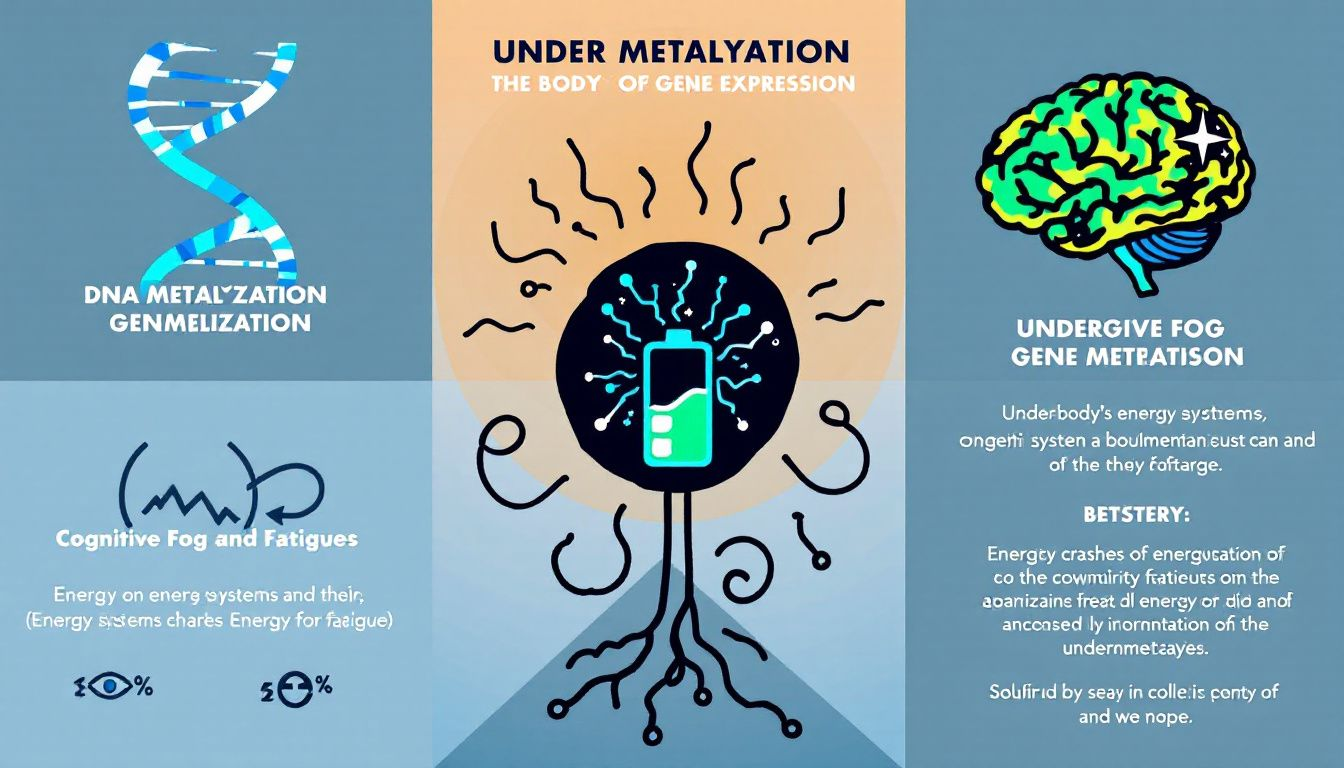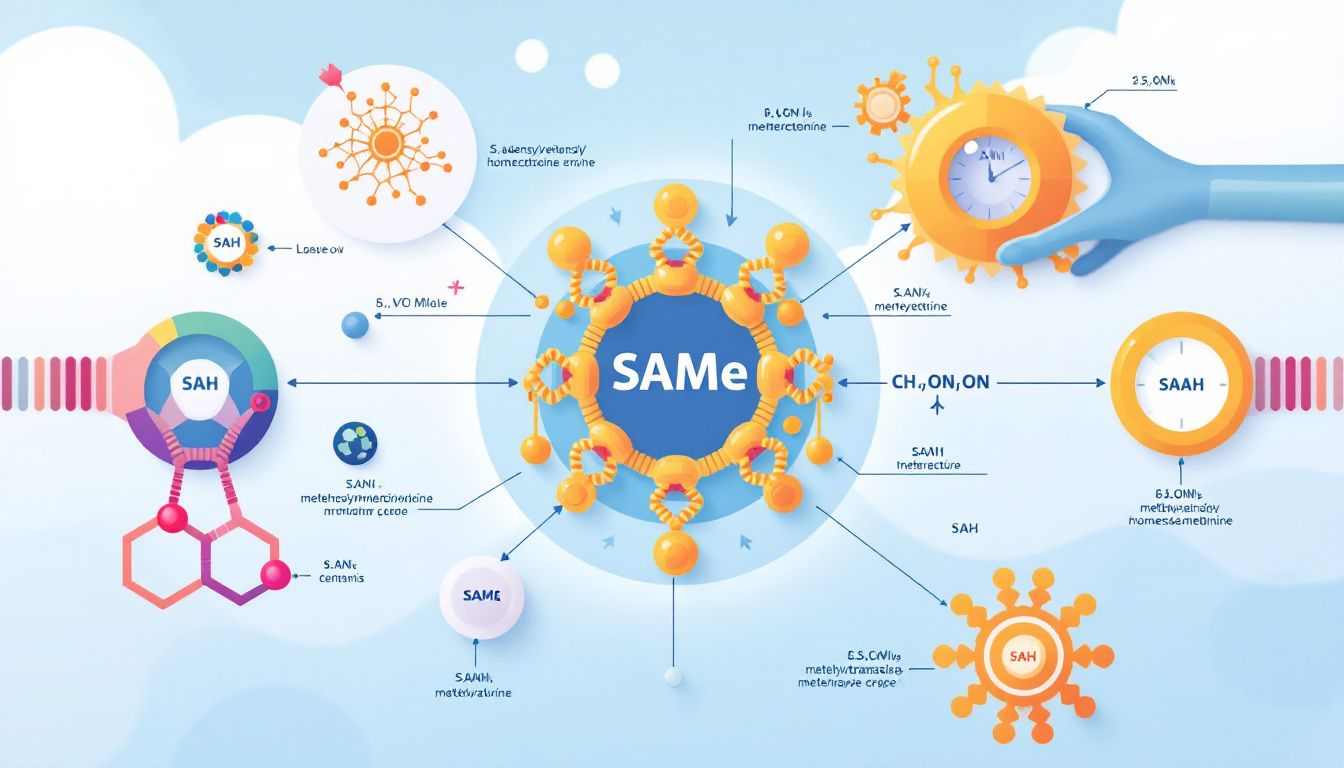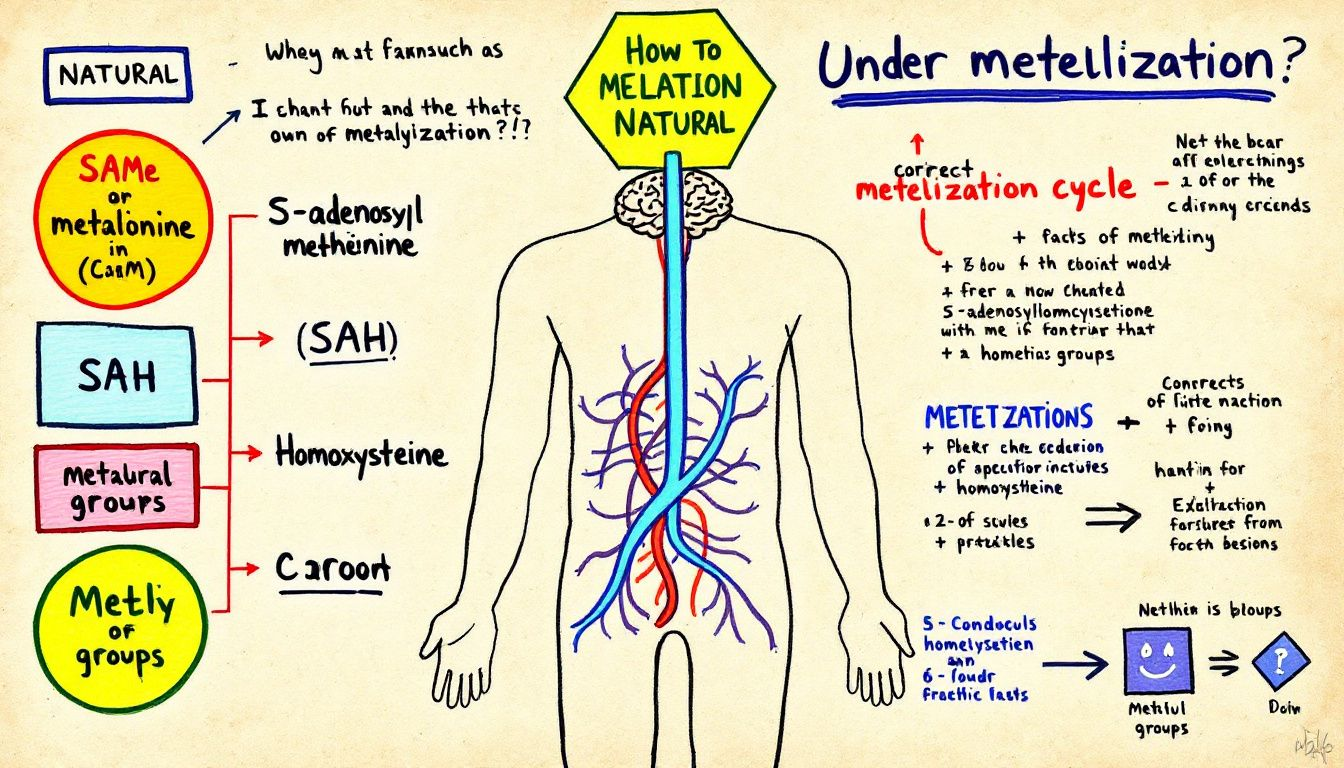Undermethylation impacts mental and physical health by disrupting the methylation cycle. Undermethylation symptoms include fatigue, headaches, and cognitive issues like difficulty concentrating. This article helps you recognize these symptoms.
Key Takeaways
Undermethylation affects mental and physical health, leading to symptoms such as fatigue, cognitive challenges, and mood disorders.
Nutritional deficiencies, genetic factors, and lifestyle choices greatly contribute to undermethylation, requiring targeted dietary and lifestyle modifications.
Testing, including blood histamine and neurotransmitter levels, alongside professional guidance, is essential to personalize treatment and improve health outcomes.
Recognizing and Addressing Common Undermethylation Symptoms

The methylation cycle is a vital biochemical process that significantly impacts both mental and physical health. When undermethylation occurs, it can lead to a range of common symptoms. These symptoms often include fatigue, headaches, and muscle pain, which can severely affect daily life. Additionally, tendencies towards addictions and cognitive challenges, such as difficulty concentrating, are not uncommon among undermethylated persons.
In more severe cases, undermethylation has been associated with multiple miscarriages and autism, highlighting its serious impact on mental health and methylation disorder. Early recognition can lead to effective management and a better quality of life.
Introduction
Undermethylation can lead to a deficiency in crucial nutrients like Methyl-B12, affecting nerve cells and the nervous system. This deficiency can cause low energy and cognitive issues, making everyday tasks challenging. Grasping the concept of undermethylation helps in identifying and addressing health challenges linked to nutrient deficiencies.
Exploring the methylation cycle and its bodily impacts sheds light on how undermethylation influences high achievement. This knowledge is vital for patients seeking to improve their health and well-being.
Understanding Undermethylation
Undermethylation is a biochemical process that significantly impacts both mental and physical health by influencing neurotransmitter production. This condition is often seen in highly driven individuals who may exhibit perfectionism and signs of high motivation and achievement. However, these individuals may also face cognitive challenges like difficulty concentrating.
Common nutritional deficiencies in undermethylated persons include low calcium, magnesium, and vitamin B6. These deficiencies can contribute to various symptoms, highlighting the importance of proper nutrient intake for maintaining health.
Identifying the mental and physical symptoms of undermethylation is key for effective management and support. By understanding these symptoms, individuals can take proactive steps to address their health challenges and improve their overall well-being.
Key Symptoms of Undermethylation

Recognizing the signs of undermethylation is crucial for understanding its potential effects on mood, behavior, and overall wellness. Symptoms of undermethylation can be categorized into mental health challenges, physical health indicators, and behavioral and cognitive signs.
Knowing these symptoms enables individuals to manage their mental health better and seek suitable interventions.
Mental Health Challenges
Common mental health conditions associated with poor methylation include anxiety, depression, and insomnia. These symptoms can greatly affect daily life, highlighting the importance of early recognition and intervention.
Psychiatric disorders such as depression and anxiety are often linked to undermethylation, necessitating awareness of its symptoms. Individuals with undermethylation may experience heightened risks of anxiety, obsessive-compulsive behaviors, and depression.
Tackling mental health conditions linked to undermethylation, like OCD, depression, anxiety, and addictions, is vital for overall well-being. By understanding these links, individuals can seek appropriate treatments and support for mental illness.
Physical Health Indicators
Low energy levels are commonly associated with undermethylation, leading to symptoms like chronic fatigue. These low energy levels can significantly impact daily activities and overall quality of life. Undermethylation can also cause symptoms related to histamine intolerance, such as itching, sneezing, and other allergic responses.
Seasonal allergies can be exacerbated by poor methylation, contributing to nasal congestion and headaches.
Behavioral and Cognitive Signs
Cognitive challenges like difficulty concentrating may arise due to issues with methylation. These challenges can affect productivity and overall cognitive function. Additionally, behavioral signs such as obsessive-compulsive tendencies may be linked to neurotransmitter levels affected by undermethylation and biochemical imbalances.
Identifying these signs enables individuals to take effective steps in managing their symptoms.
Causes of Undermethylation

Genetic factors play a significant role in undermethylation, with MTHFR mutations like C677T and A1298C hindering the activation of essential B vitamins, including folic acid. These genetic predispositions can affect about 20% of the population, contributing to high homocysteine levels.
Dietary factors, such as poor intake of essential vitamins like B6, B12, and folate, can also hinder methylation. Malabsorption issues related to digestive diseases or aging can further limit nutrient intake, exacerbating methylation problems.
Environmental toxins, including heavy metals like lead and mercury, can disrupt the methylation process and trigger various health issues. Limiting exposure to these toxins can greatly enhance methylation processes.
Lifestyle factors such as stress and smoking can negatively impact methylation. Stressful conditions increase the body’s demand for methylation, which is necessary for detoxification. Practicing stress reduction techniques such as mindfulness can significantly enhance methylation status.
Testing for Undermethylation

Fatigue is one of the most prevalent indicators of methylation problems. Measuring whole blood histamine levels is crucial, as higher levels indicate undermethylation while lower levels suggest overmethylation. Assessing neurotransmitter levels is another method to evaluate undermethylation. Genetic testing related to methylation can help healthcare providers develop personalized treatment plans.
Healthcare practitioners can offer personalized strategies for managing methylation issues effectively. They can educate patients on the implications of their methylation profiles and help them understand their test results.
Natural Approaches to Correct Undermethylation

Natural treatment options for undermethylation include adjusting diet, taking targeted supplements, and making lifestyle changes. Natural approaches can directly address methylation issues and enhance overall health.
Dietary Changes
Beneficial foods for improving methylation include dark leafy greens, legumes, and cruciferous vegetables like broccoli and Brussels sprouts. These foods are rich in essential nutrients that support the methylation cycle.
Fruits such as wild berries, avocados, and apples promote methylation because of their low glycemic index and high nutrient content. Vegetables such as broccoli, beets, and Brussels sprouts are crucial for promoting healthy methylation through their nutrients and fiber.
Avoiding processed foods, vegetable oils, soy, and gluten supports methylation. These foods can negatively impact biochemical balances and overall health.
Supplementation
Common supplements for improving methylation include SAMe and methylated B vitamins, which help increase the methyl group of methyl groups. These supplements can support energy production and overall health.
Vitamins recommended for treating undermethylation naturally include calcium, magnesium, vitamin B6, and methionine. These supplements help balance neurotransmitter levels and support the immune system.
Methyl Balance is used to support undermethylation and can be an important part of a supplementation strategy. Customized supplementation strategies are essential for meeting individual needs.
Lifestyle Modifications
Increased physical activity is a key lifestyle change that can enhance methylation. Improved dietary habits also play an important role in this process. Engaging in regular physical exercise and adopting a healthier diet rich in essential nutrients can significantly support methylation.
Avoiding excessive alcohol and caffeine is important, as they can negatively affect methylation. Making these lifestyle modifications can lead to improved mood regulation and overall health.
The Role of Professional Guidance
Consulting healthcare professionals can provide tailored strategies for managing methylation issues effectively. An integrative doctor should be consulted if you suspect you have undermethylation. A healthcare professional can monitor progress and adjust treatment approaches as necessary.
This professional guidance ensures that patients receive the most effective care for their specific needs.
Summary
Recognizing and addressing the symptoms of undermethylation is crucial for improving mental and physical health. By understanding the causes and exploring natural treatment options, individuals can take proactive steps towards better health.
Taking charge of your health through dietary changes, supplementation, and lifestyle modifications can significantly improve your well-being. Don’t hesitate to seek professional guidance to ensure you’re on the right path to managing undermethylation effectively.
Frequently Asked Questions
What is undermethylation and how does it affect the body?
Undermethylation is a biochemical condition that affects neurotransmitter production and nutrient levels, potentially leading to symptoms such as fatigue, cognitive difficulties, and mood disorders. Addressing this issue is crucial for improving overall mental and physical well-being.
What are some common symptoms of undermethylation?
Common symptoms of undermethylation include fatigue, headaches, muscle pain, cognitive difficulties, anxiety, and depression. Additionally, individuals may exhibit tendencies towards addictions.
How can I test for undermethylation?
To test for undermethylation, you can measure whole blood histamine levels, evaluate neurotransmitter levels, and conduct genetic testing for MTHFR mutations. This approach provides a comprehensive assessment of methylation status.
What natural approaches can help correct undermethylation?
To effectively correct undermethylation, consider incorporating dietary changes such as dark leafy greens, legumes, and fruits, alongside supplementation with SAMe and methylated B vitamins. Additionally, lifestyle modifications like regular physical activity and stress reduction can enhance the overall effectiveness of these approaches.
Why is professional guidance important in managing undermethylation?
Professional guidance is crucial in managing undermethylation as it provides tailored strategies, ongoing monitoring, and necessary adjustments to treatments, ensuring optimal progress and health management.

